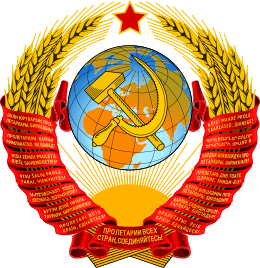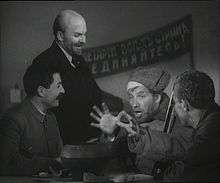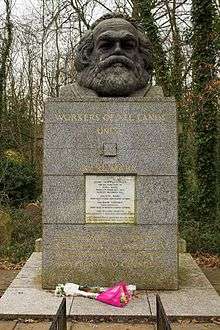Workers of the world, unite!
The political slogan "Workers of the world, unite!" is one of the most famous rallying cries from The Communist Manifesto (1848)[1][2][3][4] by Karl Marx and Friedrich Engels (German: Proletarier aller Länder vereinigt Euch!, literally "Proletarians of all countries, unite!",[5] but soon popularised in English as "Workers of the world, unite! You have nothing to lose but your chains!").[5][note 1] A variation of this phrase ("Workers of all lands, unite") is also inscribed on Marx's tombstone.[7] The essence of the slogan is that members of the working classes throughout the world should cooperate to defeat Capitalism and achieve victory in the class conflict.


Overview

Five years before The Communist Manifesto, this phrase appeared in the 1843 book The Workers' Union by Flora Tristan.[8]
The International Workingmen's Association, described by Engels as "the first international movement of the working class" was persuaded by Engels to change its motto from the League of the Just's "all men are brothers" to "working men of all countries, unite!".[9] It reflected Marx's and Engels' view of proletarian internationalism.
The phrase has overlapping meanings: first, that workers should unite in unions to better push for their demands such as workplace pay and conditions;[10] secondly, that workers should see beyond their various craft unions and unite against the capitalist system;[11] and thirdly, that workers of different countries have more in common with each other than workers and employers of the same country.
The phrase was used by the Industrial Workers of the World (IWW) in their publications and songs[12][13] and was a mainstay on banners in May Day demonstrations. The IWW used it when opposing World War I in both the United States[13] and Australia.[14]
The slogan was the Soviet Union's state motto (Пролетарии всех стран, соединяйтесь!; Proletarii vsekh stran, soyedinyaytes'!) and it appeared in the State Emblem of the Soviet Union. It also appeared on 1919 Russian SFSR banknotes (in Arabic, Chinese, English, French, German, Italian and Russian), on Soviet coins from 1921 to 1934 and in most Soviet newspapers.
Some socialist and communist parties continue using it.[15] Moreover, it is often chanted during labor strikes and protests.
Variations
In the first Swedish translation of The Communist Manifesto, published in 1848, the translator Pehr Götrek substituted the slogan with Folkets röst, Guds röst! (i.e. Vox populi, vox Dei, or "The Voice of the People, the Voice of God"). However, later translations have included the original slogan.[16]
Among Maoist-oriented groups a variation invented by Vladimir Lenin, "Workers and Oppressed Peoples and Nations of the World, Unite!", is sometimes used. This slogan was the rallying cry of the 2nd Comintern congress in 1920 and denoted the anti-imperialist and anti-colonialist agenda of the Comintern.
As the national motto of Countries
Use by the Soviet Union and its satellites as an official motto, as used in the official emblem of the Soviet Union:
- Armenian: Պրոլետարներ բոլոր երկրների, միացե՛ք
- Romanization: Proletarner bolor yerkrneri, miats'ek'!
- Azerbaijani: Bütün ölkələrin proletarları, birləşin!
- Cyrillic: Бүтүн өлкәләрин пролетарлары, бирләшин!
- Belarusian: Пралетарыі ўсіх краін, яднайцеся!
- Łacinka: Praletaryi ŭsich krain, jadnajciesia!
- Estonian: Kõigi maade proletaarsed, ühinege!
- Finnish: Kaikkien maiden proletaarit, liittykää yhteen! (before 1956)
- Georgian: პროლეტარებო ყველა ქვეყნისა, შეერთდით!
- Romanization: Proletarebo q'vela kveq'nisa, sheertdit!
- Kazakh: Барлық елдердің пролетарлары, бірігіңдер!
- Romanization: Barlyq elderdiń proletarlary, birigińder!
- Kyrgyz: Бардык өлкөлордүн пролетарлары, бириккиле!
- Romanization: Bardık ölkölordün proletarları, birikkile!
- Latvian: Visu zemju proletārieši, savienojieties!
- Lithuanian: Visų šalių proletarai, vienykitės!
- Romanian: Proletari din toate țările, uniți-vă!
- Russian: Пролетарии всех стран, соединяйтесь!
- romanization: Proletarii vsekh stran, soyedinyaytes'!
- Tajik: Пролетарҳои ҳамаи мамлакатҳо, як шавед!
- Romanization: Proletarhoi hamai mamlakatho, yak shaved!
- Turkmen: Ähli ýurtlaryň proletarlary, birleşiň!
- Cyrillic: Әхли юртларың пролетарлары, бирлешиң!
- Ukrainian: Пролета́рі всіх краї́н, єдна́йтеся!
- Romanization: Proletari vsikh krayin, yednaytesya!
- Uzbek: Butun dunyo proletarlari, birlashingiz!
- Cyrillic: Бутун дунё пролетарлари, бирлашингиз!
Use as official motto by the German Democratic Republic:
- German: Proletarier aller Länder, vereinigt Euch!
Use as official motto by the Czechoslovak Socialist Republic:
- Czech: Proletáři všech zemí, spojte se!
- Slovak: Proletári všetkých krajín, spojte sa!
Use as official motto by the Hungarian People's Republic:
- Hungarian: Világ proletárjai, egyesüljetek!
Use as official motto by the Socialist Republic of Romania:
- Romanian: Proletari din toate țările, uniți-vă!
Use as official motto by the People's Socialist Republic of Albania:
- Albanian: Proletarë të të gjitha vendeve, bashkohuni!
Notes
- The final paragraph of The Communist Manifesto was translated by Samuel Moore as follows: "The Communists disdain to conceal their views and aims. They openly declare that their ends can be attained only by the forcible overthrow of all existing social conditions. Let the ruling classes tremble at a Communistic revolution. The proletarians have nothing to lose but their chains. They have a world to win. WORKING MEN OF ALL COUNTRIES, UNITE!". This translation is the authorised translation by Marx and Engels and is the most commonly used version in English.[6]
References
- Gabrijela Kišiček; Igor Ž. Žagar (3 October 2013). What Do We Know About the World?: Rhetorical and Argumentative Perspectives. University of Windsor. p. 471. ISBN 978-0-920233-70-2.
One of the most famous rallying cries of communism Workers of the world, unite!
- Simon Levis Sullam (21 October 2015). Giuseppe Mazzini and the Origins of Fascism. Palgrave Macmillan US. p. 91. ISBN 978-1-137-51459-2.
only a few years later, would give the famous rallying cry Workers of t...
- Edward R. Kantowicz (1999). The Rage of Nations. Wm. B. Eerdmans Publishing. p. 21. ISBN 978-0-8028-4455-2.
titled The Communist Manifesto, which contained the famous rallying cry: "Workers of the w...
- Ronald Niezen (15 April 2008). A World Beyond Difference: Cultural Identity in the Age of Globalization. John Wiley & Sons. p. 129. ISBN 978-1-4051-3710-2.
The famous rallying cry from The Communist Manifesto, “workers of the world unite!” was meant only to hasten the [...]
- "Translator's note to the Communist Manifesto". Marxists.org. Marxist Internet Archive. Retrieved 14 February 2015.
- Marx, Karl; Engels, Friedrich (2002). Jones, Gareth Stedman (ed.). The Communist Manifesto (New ed.). London: Penguin. ISBN 978-0-140-44757-6.
- Wheen, Francis (2002). "Introduction". Karl Marx: A Life. New York: Norton.
- Marie M. Collins and Sylvie Weil-Sayre (1973). "Flora Tristan: Forgotten Feminist and Socialist". Nineteenth-Century French Studies. 1 (4): 229–234. JSTOR 23535978.
- Lucia Pradella in 'The Elgar Companion to Marxist Economics.' Edited by Ben fine and Alfredo Saad-Filho, 2012, p.178.
- Wiktionary, entry for "Workers of the World"
- Karl Marx and Friedrich Engels, The Communist Manifesto, 1848.
- Joseph Grim Feinberg, "The Gifts of the IWW," Against the Current 117, July–August 2005.
- Melvyn Dubofsky, We Shall Be All, Quadrangle Books, 1969.
- Nick Armstrong, "The Industrial Workers of the World," Socialist Alternative, June 2005.
- Thurston, Robert W.; Bonwetsch, Bernd (2000). The People's War: Responses to World War II in the Soviet Union (illustrated ed.). University of Illinois Press. p. 64. ISBN 9780252026003. Retrieved 19 March 2015.
- Götrek, Pehr (1848). Kommunismens röst : förklaring af det kommunistiska partiet, offentliggjord i februari 1848. Pogo Press. ISBN 91-7386-018-2.. libris 7639421. reprint of libris 2683080.
External links
| Wikimedia Commons has media related to Workers of the world, unite!. |
| Look up workers of the world, unite in Wiktionary, the free dictionary. |
- Manifesto of the Communist Party by Karl Marx and Friedrich Engels. Translated by Samuel Moore in cooperation with Frederick Engels, 1888.
- Chapter 4 of The Communist Manifesto.
- Collection of Quotes by Karl Marx


